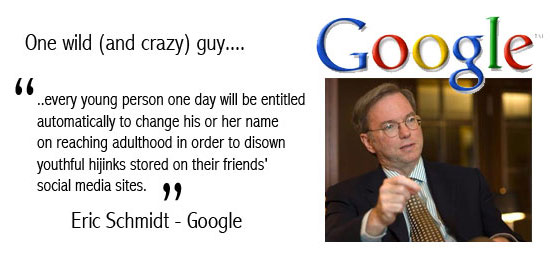Convenience or Conspiracy? You Decide.
What once started as a convenience for users has, over time, started to sound more like some Orwellian nightmare stalking us at our every turn. When this all began search was relatively sterile and innocuous. We type in a few words and get back a bunch of blue links… 10 of them at a time. But that wasn’t enough. Google wanted to know us even better. Coddle and direct us to what we really want.
So what’s the big deal? Well, could be nothing. Or it could be a rather problematic trend among the sinews of evolution for our kind. Depends on who you talk to.

Let’s Get Personal…
While I could easily eat up the equivalent of a book on the topic, we shall try and hit just a few of the high level concepts of where we’ve come to in recent years.
Of the stated goals at Google a deep, broad and comprehensive personalization as been top of the food chain for many years now. But what exactly is personalization anyway? It mostly falls under what is known as implicit and explicit user feedback (behavioural data) and can include;
- Search History
- Surfing History
- Implicit actions (assumptions)
- Explicit actions (active participation)
- Geo-localized data
- Application focus (technology you use)
How much does this really affect the SERP presentation? Last we checked there was still some reasonable flux, but that should be changing. To this point personalization has been on a ‘user group’ level, new technology means they can get more granular with that.
User Profiling
Next we can go a bit further. With Google multitude of services from Gmail to Profiles, they have increasingly locked users into a loop which they can further glean information from. They can look at associations between you and your various online entities from social to business and personal websites.
A few years back there were some interesting patents on user profiling (see; Social networks are Open for profiling ) that went into quite some detail as to the level of information they’d consider collecting including;
- Search and surfing history (again)
- Sentiment – interests and non-interests
- Demographic information (age, employment etc..)
- Geo-localizations
- Friend connections (aka FriendRank)
And these data points can be used to categorize users by;
- Common behaviour
- Similar groups (memberships)
- Similar profile data
- Content shared
Once more, as with earlier personalization, they tend to group us more so than a granular person-by-person approach. New processing power will again enable more of this.

Enhancing the Social Graph
From that point we have seen the rise of the Google user profile. From here they have been able to gather even more data including;
- user acquaintance data
- user group data
- user media data
- user options data
- and other user data
Now, let’s stop there a moment. What was the point of all of this profiling? Does Google want to make sure they buy you that special something you’ve longed for, on Christmas? Highly unlikely. While many of these technologies have organic search implications, there is never any shortage of interest towards tighter targeting of Ads, their real money maker.
Now, back to the social graph. They have now extended this to seek out not only Google data but any social data they can get they’re hands on. For more on the social graph API and examples;
“The Social Graph API makes information about the public connections between people on the Web easily available and useful for developers. Developers can query this public information to offer their users dramatically streamlined “add friends” functionality and other useful features.” – Google Social Graph
- Site Connections – entering URLs to your (or competitors/targets) blogs and profile pages let U see social connections
- My Connections – enter URLs, and it looks for social connections; who you link to and who links to you
This of course has also lead to the world of Realtime and Social Search as well. But never forget, there is always a targeting element to all of this. At the end of the day it really does creep me out.
Holy Trinity of Behavioural Targeting
Guess what? We’ve only scratched the surface. Because there is so much more going on here than we really notice. As it has been said in the past; behavioural targeting is one small step from behavioural modification. Sure, this might be a bit thick on the tin foil, but worth considering none-the-less.
Let us take what we know and start to look at the full range of data gathering points now in place;
- Your computer – tracking online actions and interests
- Your Mobile Phone – also now helping to flesh out the profile
- You TV – Google TV now allows for more behavioural data (see; Google TV; it’s all about the data )
And people are complaining about them scooping a little Wi-fi action? Wow. Seems the privacy advocates have missed the proverbial boat and not done well connecting the dots either. Is this limited to Google? Of course not. It is prevalent everywhere. But Google has far more reach and data access than most, which is why this is (potentially) troubling.
Or is it? As a geek I am fascinated with the technologies and more than a little jealous I can’t access this kind of data gold mine. But that is the geek in me. As a parent, a fellow human being, I can see where all of this could be more than just a little concerning. It’s a love hate kind of thing.

Things are getting weird
And so before I leave, let us consider recent statements from Google’s Eric Schmidt;
“I actually think most people don’t want Google to answer their questions, they want Google to tell them what they should be doing next.”
“(…) we know roughly who you are, roughly what you care about, roughly who your friends are.” (source; WSJ )
Essentially, in the future, we will be able to allow Google to think for us. Sounds appetizing don’t it? And just for fun, since we’re going there, seems that Google has also invested in a company that processes DNA. Maybe someday they will know us all right down to the molecular level huh?
So I shall leave it to you, dear reader; do you believe Google (or any powerful company) knowing you better is a good thing? Will it make your life more convenient? Or is this something that has the potential for abuse if it goes out of control and is accepted as the norm?
Sound off in the comments!





![AI Overviews: We Reverse-Engineered Them So You Don't Have To [+ What You Need To Do Next]](https://www.searchenginejournal.com/wp-content/uploads/2025/04/sidebar1x-455.png)